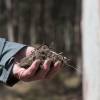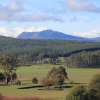
Embracing Opportunities in Tasmania's Forests: Meet PFT’s new Operations Manager
Posted 05 June 2024
Forestry has been in Jarrod Burn’s blood since he was a child working alongside his father on a forest harvesting operation.
"I’m a fifth-generation timber industry worker," he said.
Growing up on a family farm in the Liffey Valley, which included managed native forests, Jarrod was picking seeds for helicopter at the age of nine.

His career has since taken him back to that helicopter for work.
"I’ve been involved in the full cycle of forestry, including planning the harvesting of native forests that my dad felled about 20 years ago," he said.
With more than 20 years of forestry experience, Jarrod is stepping into a new role at Private Forests Tasmania (PFT) with enthusiasm and a clear vision for the future.
Jarrod sees significant opportunities within private forestry in Tasmania, particularly in mitigating climate change through active native forest management.
"Sustainable practices can enhance carbon sequestration and contribute to global climate goals,” he said.
He also discussed the importance of changing perceptions about the value of trees in agricultural settings, a challenge lingering from the Managed Investment Scheme (MIS) days.
Jarrod believes private forestry can play a crucial role in reducing the national trade deficit in wood products and strengthening Tasmania's economic resilience.
"Private forestry is at the forefront of promoting the management of a resource that can bolster our economy," he said.
Jarrod’s journey in forestry has been extensive. After completing a technical traineeship, he spent several years in the private sector before returning to Forestry Tasmania (now Sustainable Timber Tasmania)
His tenure as a planning coordinator at STT included completing an MBA, which helped to broaden his strategic thinking around forest management and promoting the sustainability and value of forests beyond just production.
"Private forestry is incredibly broad, covering everything from environmental and remedial works to large-scale industrial plantation management," he said.
“The private estate in Tasmania has the most potential to expand and actively manage forests, addressing some of the most pressing challenges of the 21st century. By leveraging this potential, we can ensure our forests continue to provide ecological, economic, and social benefits for generations to come," he said.
Jarrod’s vision for Private Forests Tasmania is clear: embrace sustainable practices, shift perceptions, and promote the economic value of well-managed forests.
Jarrod and the Operations Team can be contacted on admin@pft.tas.gov.au or call 1300 661 009

Share this Article
Latest Articles
-

20 October 2025
Tasmanian High Soil Carbon Landscapes project
-

17 September 2025
Celebrating excellence at the Tasmanian Timber Awards
-

17 September 2025
Forest Practices Authority Research Update Day
Archives
- ActivAcre hits milestone, calls for more farmers to get on board
- Napier's leading the way in sustainable forestry and carbon-neutral farming
- Sound science needed to assess carbon impacts of timber harvesting
- Newly appointed TFFPN Board of Directors
- Graduate Certificate of Forestry Scholarship
- Forestry Australia Mentoring Program 2025
- Forest Industry Roundtable planning for the long term
- Eagle Management Constraint Period extended
- Successful private native forest management celebrated
- $15 million investment in new ship loader to boost Bell Bay's forestry exports
- Standing with Tasmania's forestry industry: buy local
- TFPA: Tasmanian Freight Equalisation Scheme needs a ground-up review
- AFCA Gala Dinner celebrates industry excellence
- Fire permits now required Statewide
- Forest leaders hone skills in sustainable native regrowth management
- Tasmanian forests and the carbon market: Barriers and opportunities
- What the 2024-25 Tasmanian Budget means for forestry
- Spring is the time for fuel reduction burning
- Primed for Growth: A situation analysis of the Tasmanian Forest and Wood Products Sector
- Audit requirements cut for low-risk plantation projects
- Guidance and support for landowners after damaging winds
- Forestry Australia welcomes further definition of active forest management
- Farm & Forest Mapper Tool highlighted at Rural Youth Tasmania's Young Farmer of the Year competition
- Senate Select Committee inquiry into the Tasmanian Freight Equalisation Scheme
- Timberlink announces new wood composite products brand
- Newly developed protocol a vital tool for safeguarding forestry industry
- Red Hot Tips: Fire management for Tassie farmers
- Bioenergy: Fuelling industries with trees
- Harvesting trees: What you need to know
- Shelterbelts: How are they contributing to farm systems?
- Infill plantings and remnant vegetation: Why biodiversity depends on a thriving understory
- Plantation planning: The key to a successful plantation
- Exciting interactive forestry knowledge hub launched
- $450,000 farm forestry grant recipients revealed


